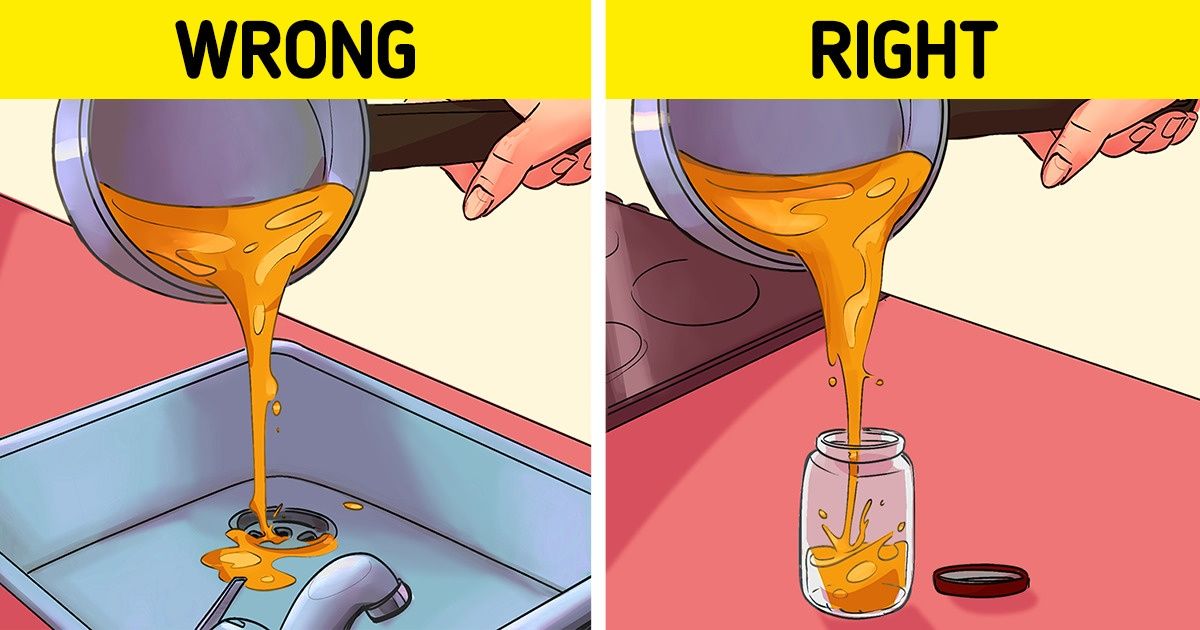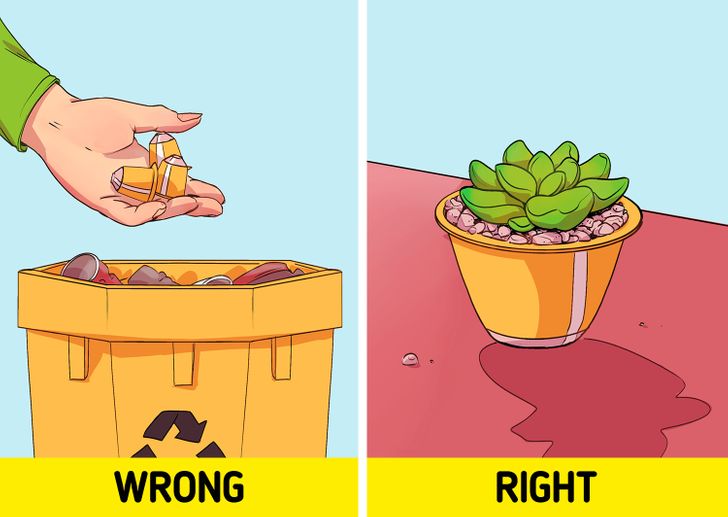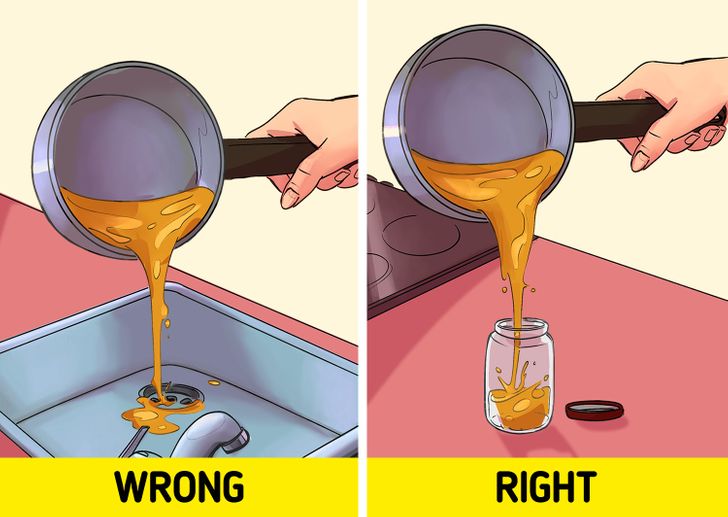11 People Who Chose Humanity Over Hatred in the Darkest Moments


The easiest and most common thing to do when something is no longer useful is to throw it away, and then most of us just forget that the object even existed. But your garbage undergoes a whole cycle that not many people know about (dividing, recycling, etc). However, not all objects can be “thrown away” just like that. Some of the most common things we use every day, like batteries or cosmetics, are tremendously toxic and can actually have a big environmental impact if not treated properly. Some others, like hair or food scraps, can be reused without necessarily having to be treated by experts.
In both cases, it’s important for people to know what to do with their trash and raise awareness about the fact that an object isn’t just gone once you put it in the bin. That’s why Bright Side made a list of household waste that deserves special attention.
Lighters contain gases that are used to generate fire by means of a friction mechanism that causes sparks. It’s already a particularly dangerous object to have, let alone to store. It can’t just be kept in just any place, especially if this place is subject to high temperatures. On top of that, the gas inside all lighters is harmful to the environment, so it cannot be disposed of in the same way as any other waste.
It’s because of all those reasons that they can’t be thrown into a landfill. In theory, you shouldn’t even throw them into containers for recyclable products. It’s best to consult with an NGO or to look for places specifically meant to handle this type of waste. And once you got rid of your disposable lighter, you might want to consider getting a rechargeable one to reduce the impact your activities have on the environment.
While most cosmetic packaging is made of glass or plastic, what’s inside might not be as recyclable or environmentally-friendly as you’d think. There are many cosmetics that contain substances that can be harmful not only to your health but also to the environment. That’s why some governments have taken measures to regulate the use of some ingredients that were common in the manufacturing of makeup, creams, and cosmetics in general.
A good option is to replace big brand cosmetics with products made with natural ingredients that you know are not dangerous for your skin, or even make some yourself at home. If that’s not an option, you can at least try to reduce your consumption of cosmetics made with harmful substances that have a high environmental impact.
Many paints that are or were commonly sold in the market contain materials like lead, which is harmful to the environment. That’s why it’s important to avoid disposing of containers that still contain traces of these types of chemicals in regular waste bins. The best thing to do is to send them to organizations dedicated to the treatment of toxic waste. That and, of course, to opt for the use of natural pigments that do not have a great impact on the environment whenever that’s possible.
While human hair is not necessarily harmful for the environment, it can be harnessed for use as compost in the agricultural sector. This is because it contains nitrogen and other components that, when released, can be beneficial to plants. So, every time you cut your hair or beard, consider this fact before throwing it away. Not only that, but in some cases, it can also be used to make wigs for people suffering from various diseases.
If your plants died for some reason, instead of simply tossing them in the trash bin, you might want to use them as compost for your or a friend’s garden. Any biodegradable material can be composted, and that includes fruit scraps and wilted flowers, among other common household waste products. Composting requires the presence of microorganisms that accelerate the decomposition process to create a soil suitable for cultivation, but you can actually do that at home if you want to.
Filters are the perfect way of purifying water supplied to households and to finally get rid of bottled water altogether. But after a lot of use, filters no longer retain harmful substances, which means they must be replaced immediately, but also that you have to make sure to discard them in a special way. Fortunately, many companies take in used filters so that you can exchange them for new ones and avoid environmental pollution.

The problem with coffee capsules, depending on the materials used to make them, is that they are not easily recyclable. For instance, in the UK authorities do not collect them due to the mix of materials, concerns over size in relation to sorting equipment, and contamination from coffee grounds. Some companies offer the possibility of collecting/dropping used capsules at their stores, while others choose to make them with compostable materials. In any case, you can also choose to make crafts with them and give them a use that is different from their main purpose. You could choose to use a reusable coffee pod.
Some batteries can contain mercury and manganese, which are toxic and harmful to both your health and the environment. That’s why, if they wear out due to constant use, you should take them to special battery banks that are made for discarding these types of goods. Also, always make sure your batteries are safe to handle. Broken batteries can be unsafe and could cause mercury poisoning.
In any case, if you want to reduce your consumption of alkaline and common batteries, a good solution could be to buy rechargeable batteries. Many of these actually come in the same size and format as traditional batteries, so you can place them in your electronic devices without any problem. You can easily recharge them too by just connecting to your regular electrical outlet when they start to run out of power after a while.
Some aerosol sprays can be harmful to the environment because they contain a mixture of liquid and gas, which makes it easier to spray the paint. While there have been some efforts to ban the sale of some of the compounds that are known to cause damage to the ozone layer, they should still be treated with caution and should not be thrown into just any container.
A good solution is to take aerosols to a toxic materials facility where they can be discarded in the right way. And this should be the case regardless of whether we’re talking about a cleaning product, a perfume, an insecticide, a deodorant, or paint. On the other hand, if you are going to throw them away, make sure the container you’re using is completely empty.

Both cooking oil and motor oil should never be disposed of without following precautions. Cooking oil could cause water purification problems if you just throw it down the sink drain, the toilet, or simply pour it in the garbage can. It can also damage your kitchen sink and drain. On the other hand, motor oils are petroleum-based products and can easily contaminate any type of surface, including living organisms.
In these cases, it is best to take these to centers that are specialized in the treatment of this type of product. There are currently certain initiatives and research being done to create biodiesel from cooking oil in order to help minimize the impact it has on the environment.
Letters, utility bills, and credit card statements should never be thrown in the trash, as they contain personal information that could potentially fall into the wrong hands. Many thieves often rummage through trash cans to get your account information and extort money from you. If you do not want to accumulate stacks of paper, it is best to cut them into small pieces, especially those parts where your security is compromised. You can also use a shredder if you still receive lots of these papers and need to get rid of them.
In the past, most thermometers used to be mercury-in-glass thermometers. This led to a ban or new restrictions on their manufacture in some countries and some states in the US. Today, the use of other alternatives, like digital thermometers is common and recommended. However, if you still have one old thermometer at home and for some reason, it broke, do not throw it away or pour it down the drain. What you should do is wear latex gloves and pick up the material with a paper towel, duct tape, or a syringe. Then, store everything in an airtight bag and take it to a place that is in charge of toxic waste.
Computers, radios, or any electronic device or appliance could contain internal components that can be reused to a greater or lesser extent, depending on how much they’ve worn out. However, once the whole device has stopped working, you should dispose of it at a collection facility to ensure that it is treated properly and does not end up polluting the environment. As a consumer, you can also play a part by buying from brands that don’t practice planned obsolescence and that support repairing and refurbishing old devices.
Do you have waste at home that you cannot just dispose of like everything else? What measures do you take to treat them properly and avoid any environmental or health problems?











